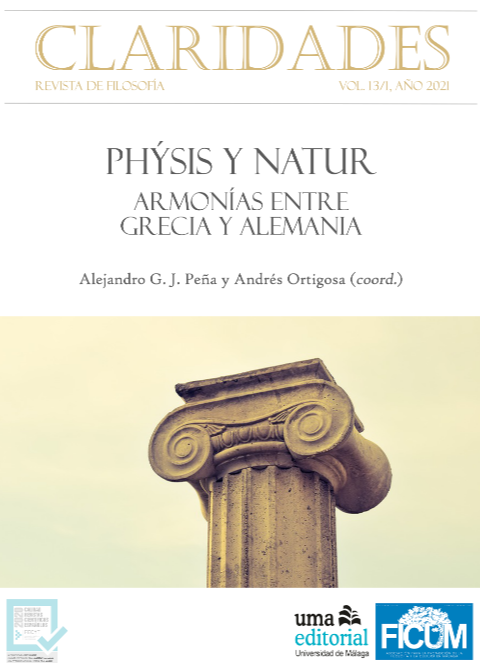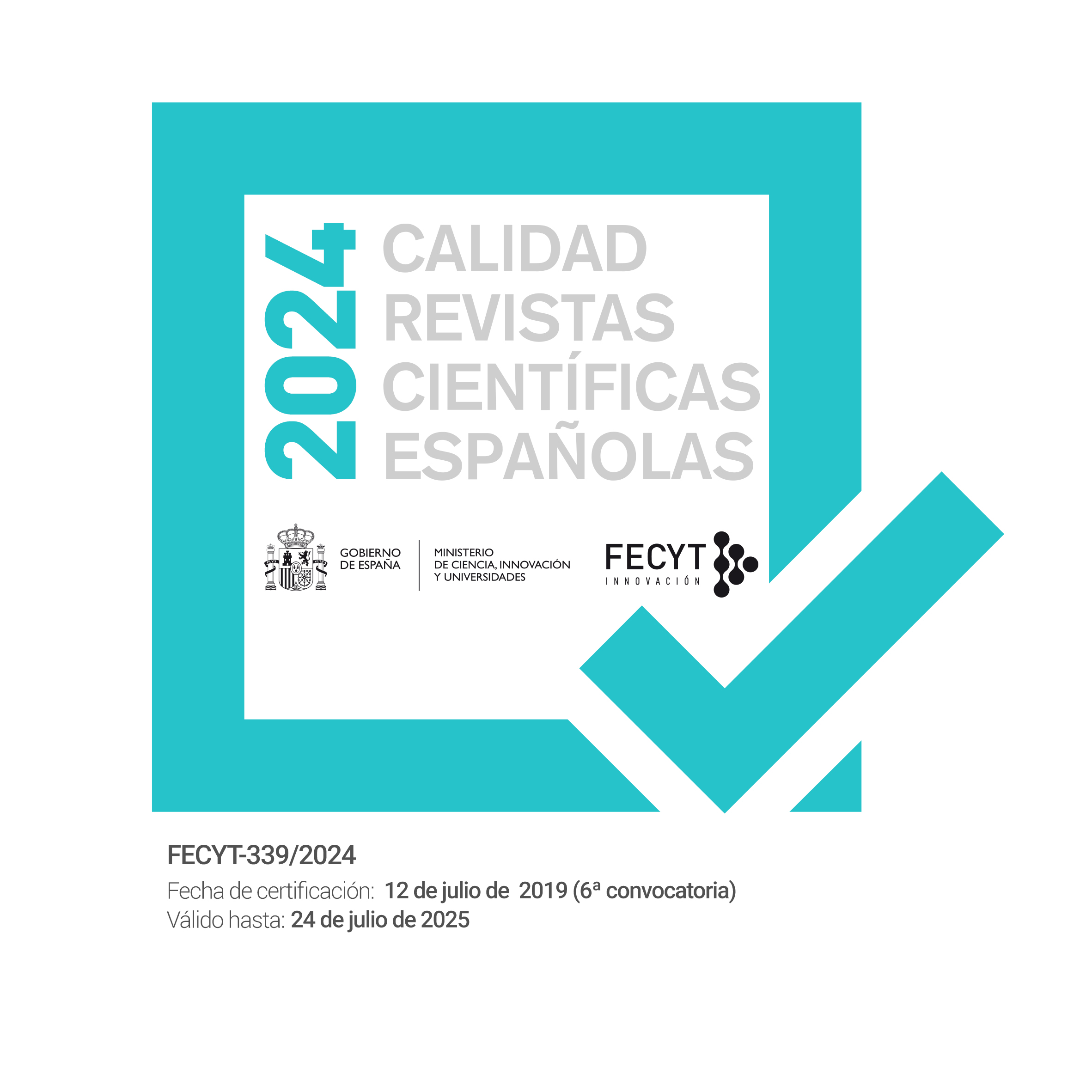Schelling and Aristotle
The question of experience
DOI:
https://doi.org/10.24310/Claridadescrf.v13i1.10303Keywords:
Experiencie, Nature, Real, Ideal, Positive philosophieAbstract
We use the concept of experience to show that the relation between experience an dthe ideal is indissoluble in both Aristotle and Schelling in their production as a whole. There is therefore no order of priority between the real and the ideal with regard to the parts of their system, as they only assume an order of anteriority and posteriority in terms of a methodological need. With this analysis, therefore, we want to show that the order of experience and the ideal is not excluding but that, on the contrary, they are in order of dependence thanks to which we have as a result an absolute philosophy or philosophy without more, which eliminates any unilateralism that wants to grant any primacy either to the ideal or to the real or the existence in the philosophy of both authors.
Downloads
Metrics
Publication Facts
Reviewer profiles N/A
Author statements
Indexed in
-
—
- Academic society
- N/A
- Publisher
- Asociación para la promoción de la filosofía y la cultura en Málaga (FICUM) y UMAEditorial
References
Fuente primarias sobre Schelling
- Schelling, F. W. J.; Schellings Werke, (Schröter, M., Hg.), C.H. Beck/ R. Oldenburg, 1966, München.
Traducciones de las fuentes de Schelling consultadas
- Schelling, F.W.J.; Experiencia e historia. Escritos de juventud, Tecnos, 1990. Madrid.
- Schelling, F. W. J.; Escritos sobre filosofía de la naturaleza, Alianza, 1996, Madrid.
Fuentes primarias sobre Aristóteles
- Aristóteles; Metafísica, Gredos, 1994, Madrid.
- Aristóteles; Física, Gredos, 1995, Madrid.
- Aristóteles; Acerca del alma, Gredos, 2003, Madrid.
Fuentes secundarias sobre Schelling
- Bubner, R.; "Dieu chez Aristote et Schelling", en Le dernier Schelling. Raison et positivité, Vrin, 1994, Paris, pp. 117-129.
- Challiol-Gillet, M.-C.; "De l'empirisme a la philosophie positive", en Schelling et l'élan du Système de l'idéalisme trascendental, L'Harmattan, 2001, Paris, pp. 207-229.
- Esposito, J. L.; Schelling’s Idealism and Philosophy of Nature, Bucknell University Press, London, 1977.
- Hamilton Grant, I.; "«Philosophy become genetic»: The Physics of the World Soul", en The new Schelling, Norman, J. y Welchman, A. (eds.), Continuum, 2004, London, pp. 128-150.
- Hogrebe, W.; Prädikation und Genesis. Metaphysik als Fundamentalheuristik im Ausgang von Schellings »Die Weltalter«, Suhrkamp, 1989, Frankfurt am Main.
- Leyte, A.; "Schelling: una biología teológica", en Los filósofos y la biología. Thémata: revista de filosofía, Núm. 20, 1998, pp. 89-106.
- Marquet, J.- F.; "L'articulation sujet-objet dans la dernière philosophie de Schelling", en Le dernier Schelling. Raison et positivité, Vrin, 1994, Paris, pp. 169-184.
- Peetz, S.; "Produktivität versus Reflexivität: Zu einem methodologischen Dilemma in Schellings Weltaltern", en Weltalter ? Schelling im Kontext der Geschichtsphilosophie, Sandkühler, H. J. (Hg.), Felix Meiner Verlag, 1996, Hamburg, pp. 73-88.
- Richir, M.; "Inconscient, nature et mythologie chez Schelling", en Schelling et l'élan du Système de l'idéalisme trascendental, L'Harmattan, 2001, Paris, pp. 177-189.
- Schlanger, J.; Schelling et la réalité finie. Essai sur la philosophie de la Nature et de l'Identité, PUF, 1966, Paris.
- Sesink, W.; "Das Subjekt aus Natur. Zur möglichen Bedeutung der Schellingschen Natur-philosphie für einen ökologisch revidierten Bildungsbegriff", en Revision der Moderne? Beiträge zu einem Gespräch zwischen Pädagogik und Philosophie. Schriften zur Bildungs ? und Erziehungsphilosophie, Band 4, Koch, L., Marotzki, W. y Peukert, H, (Hg.), Deutscher Studien Verlag, 1993, Weinheim, pp. 94-116.
Fuentes secundarias sobre Aristóteles
- Benéitez Prudencio, J. J.; “Reflexiones sobre la naturaleza humana en el pensamiento de Aristóteles”, Revista de Filosofía, vol. 36, nº 1, 2011, pp. 7-28.
- Betancourt, D. W.; “La filosofía como modo de saber”, en Práxis Filosófica Nueva, nº 37, 2013 pp. 29-55.
- Calvo Martínez, T.; “La noción de Physis en los orígenes de la filosofía griega”, en Daimon. Revista de Filosofía, nº 21, 2000, pp. 21-38.
- Giráldez, E. I.; “Sobre la investigación aristotélica en torno a las Archaí del saber relativo a la Physis”, en LOGOS. Anales del Seminario de Metafísica, vol. 41, 2008, pp. 285-313.
- Seggiaro, C. M.; “La relación entre phýsis y téchne en el Protréptico de Aristóteles y en Física II: sentido metodológico del uso de la analogía”, en Páginas de Filosofía, XVIII, nº 21, 2017, pp. 164-183.
- Segura Peraita, C.; “Una interpretación de la concepción de la “physis” entre los presocráticos. Antes y después de Parménides”, Contrastes: revista internacional de filosofía, nº 6, 2001, pp. 143-160.
- Vial Larraín, J. D.; “El tiempo en Aristóteles”, en Enrahonar, 15, 1989, pp. 11-19.
Downloads
Published
How to Cite
Issue
Section
License
Esta revista provee acceso libre inmediato a su contenido bajo el principio de hacer disponible gratuitamente la investigación al público. Todos los contenidos publicados en Claridades. Revista de Filosofía, están sujetos a la licencia Creative Commons Reconocimento-NoComercia-Compartirigual 4.0 cuyo texto completo puede consultar en <http://creativecommons.org/licenses/by-nc-sa/4.0>
Es responsabilidad de los autores/as obtener los permisos necesarios de las imágenes que están sujetas a derechos de autor.
Los autores/as cuyas contribuciones sean aceptadas para su publicación en esta revista conservarán el derecho no exclusivo de utilizar sus
contribuciones con fines académicos, de investigación y educativos, incluyendo el auto-archivo o depósito en repositorios de acceso abierto de cualquier tipo.
La edición electrónica de esta revista esta editada por la Editorial de la Universidad de Málaga (UmaEditorial), siendo necesario citar la procedencia en cualquier reproducción parcial o total.

















6.png)
